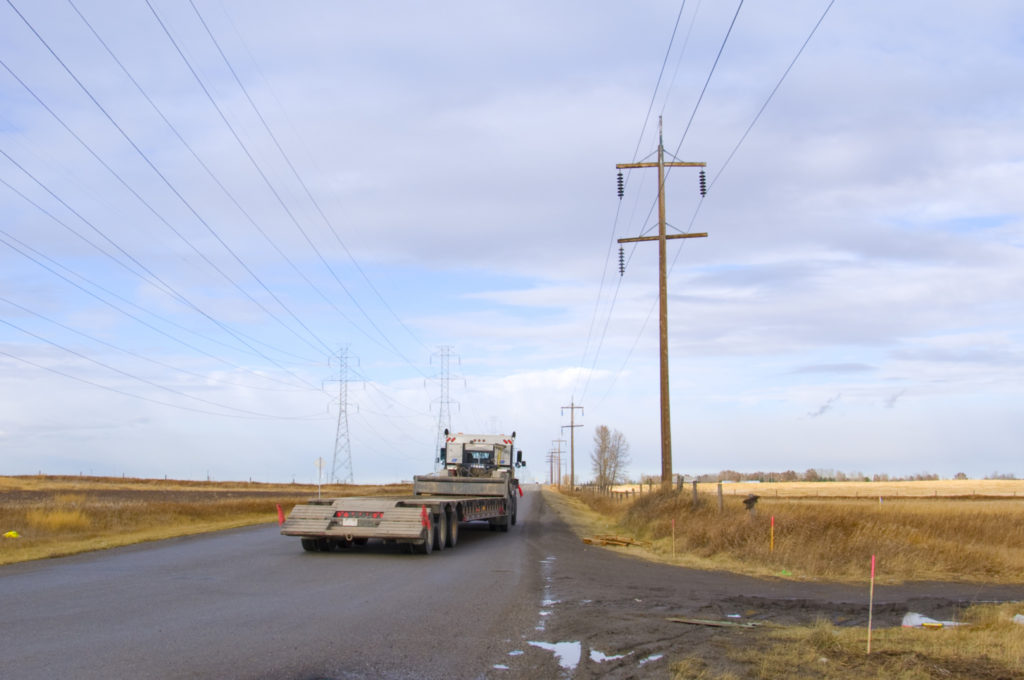Alberta truck fleets face double hit of Covid-19, low oil

EDMONTON, Alta. – Canada’s trucking industry was sent reeling by Covid-19, but the economic fallout of a pandemic has added insult to injury in Alberta.
This year was supposed to represent a turning point for the provincial economy, which had sputtered its way through 2019 and marked a deep recession in 2015-16. The federal government’s re-approval of the Trans-Mountain Pipeline project offered hope. The Federal Court of Appeal backed that decision earlier this year.
And there’s no denying the link between oil prices and Alberta’s fortunes. Each of the province’s five recessions in the past 35 years have coincided with a shock in energy prices, TD economists noted in one report.
There was a sense of “cautious optimism” a few weeks ago, agrees Chris Nash, president of the Alberta Motor Transport Association (AMTA).
Then Covid-19 hit. The value of oil futures plunged into negative territory for the first time in history on April 20, as storage tanks were filled to capacity.
Even Fort McMurray, which has been rebuilding in the wake of devastating wildfires in 2016, is now dealing with floods.

Reversal of fortunes
The Covid-related economic downturn didn’t hit everyone right away. Calgary-based Orlicks Inc. actually had to hire on an extra 30 trucks to meet surging demand for grocery shipments in mid-March. Revenues for the month doubled.
It was an experience shared by many of those who haul food and other essential supplies. At first.
While the grocery-related business is still active, the backhauls of supplies like lumber are now hard to come by. When Orlick recently shipped loads of Coke out to Saskatoon, Edmonton and Manitoba, there was nothing for the return journeys to Calgary. The 18 daily Edmonton-bound loads of groceries that Sobeys needed in March have dropped to four loads per day. Orders for shipments of bottled water that are placed one week appear to be canceled the next.
“There’s a lot of payable clerks that are not really in a hurry to pay Gene.”
– Gene Orlick, Orlicks Inc.
The fleet hasn’t laid anyone off, and it remains busy, but the downward swing will hurt.
“We’re going to be financing losses through April and May, and likely June,” says fleet president Gene Orlick. The operation doesn’t qualify for the Canada Emergency Response Benefit (CERB), either. But he did reach out to his bank for a rare visit on March 12 to secure a 25% increase in the company’s line of credit. At the time it was to deal with the bigger bills associated with surging loads and extra lease operators.
“There’s a lot of payable clerks that are not really in a hurry to pay Gene,” he says. Forty-five-day payable terms are now being pushed to 60 days. Competing carriers are slashing rates, too.
“We’re doing a risk assessment on each customer to try to predict who’s strong enough to last through this,” Orlick adds.
“Now the economic challenge is going to creep up on us,” Nash says, noting how fleets across the province will face challenges such as dropping revenues and a rising number of clients that are unable to pay their bills.
Layoffs and cutbacks
Mullen Group enjoyed its own strong start to March, when the province’s largest fleet was on target to meet expectations. Since then it has temporarily laid off 1,000 employees.
“Once the full extent of the virus started to become evident, demand deteriorated in many sectors of the economy directly impacting several of our business units. For example, we witnessed a sharp decline in the demand for discretionary consumer goods as well as in commodity-based industries,” said CEO Murray Mullen.
Other business remained steady in the first quarter of the year, such as the demands to move LTL shipments and large-diameter pipe needed to construct pipelines. As for oil, Mullen quipped that he might use parked tanker trailers to store oil rather than to haul it.
“Flatdeck carriers are soft, and there’s a bunch of those guys who parked their trucks,” Orlick says, referring to some of his peers in the province. “The oil, minus $37, I never heard such a thing.
“Our Oil Patch friends are going to suffer,” he says. “It’s been five years. It’s not a quick fix for sure.”
“The low oil value hasn’t helped.”
– Greg Sokil, Sokil Group
“The low oil value hasn’t helped,” agrees Greg Sokil of the Edmonton-headquartered Sokil Group. “It just put more pressure on the market because people won’t buy goods … We haven’t had enough time to adjust our economy.”
In the midst of it all, orders for things like furniture and appliances are placed on the back burner. And if such goods aren’t ordered, they aren’t shipped.
Nash has heard similar stories from other members who haul consumer goods.
“They parked a good chunk of their trucks,” he says. Others have faced bigger struggles. “It was a real challenge when you get into the heavy equipment stuff.”
The road to recovery
The question now is how long the downturn will last, and how quickly the economy can recover after that.
“People that think this is going to open up in two or three weeks, that’s not realistic,” Sokil says. “It’ll take some time to kickstart the economy.”
Mullen doesn’t expect much good news in the coming quarter, either, but he remains hopeful for the business that will emerge on the back end.
“I believe we will weather this crisis and come out of it stronger,” he said, citing factors like a strong cash position and diversified business. “Once the economy starts to recover we will be well-positioned to take advantage of the inevitable opportunities that arise during challenging times.”
“I am not exaggerating by stating that the job losses in the private sector are staggering,” he stressed. “The bottom line is that this health crisis is hurting a lot of people. Obviously, all of us hope that the steps taken by the governments will be successful, but realistically I doubt if we will know for quite some time.”
A new way of doing business
No matter what, Covid-related business practices are also expected to be in place for awhile.
Needs such as the widespread use of PPE, and additional steps to secure supplies for drivers, will continue, Nash says.
“This isn’t a small little hiccup … Policies and procedures, health and safety, we’re going to see a change.”
At Sokil Group, that already means things like business transactions completed from afar, and social distancing measures in the office. When PPE supplies like masks can be sourced, they’re distributed to staff. Drivers are given sanitation kits and encouraged to wipe down equipment before and after each shift.
But drivers are now more widely recognized for the work they’re doing across the province, too.
“We’ve been seeing great acknowledgement of what value there is for transportation,” Nash says, referring to how Alberta residents appear more aware of the role trucks drivers play. “To get products to the end of the line, to where it needs to be, it can’t be done without a truck. It’s great to see the notoriety [for truck drivers] … They’re the unsung heroes.”
Have your say
This is a moderated forum. Comments will no longer be published unless they are accompanied by a first and last name and a verifiable email address. (Today's Trucking will not publish or share the email address.) Profane language and content deemed to be libelous, racist, or threatening in nature will not be published under any circumstances.
Many smaller trucking companies in Alberta are in trouble without some type of government help. Many truck drivers are sitting and collecting money from the government. In many cases it will not be enough to keep them in their homes or prevent owners ops from losing their trucks. A refinery and a pipeline needs to be built. Many trucking companies are hauling loads for 5 to 15 percent less than cost to operate. We do not need any new truck drivers for one year. Many more truck drivers will join me and others in the homeless shelters.
sure the truck drivers are getting reconization now because every buddy needs them now.just wait until this thing ends and everybody gets back to work things will go back to normal and the truck drivers will be treated like garbage once again just wait and see. let’s see in a year from when this is over if people are saying the same thing about truck drivers then let’s see how many nice stories you write about people being nice to truck drivers then, i bet you won’t have any nice stories then they will all be about what a bunch assholes we are and how we are in the way and they wish we would go away.if you don’t believe me just ask all the experienced long haul truck drivers out there and see what they say.
If I am a hero why don’t they pay us for the physical and mental hazards and stress. Instead they want to pay 1975 rates. Trucks are not parked cause no freight I am a food hauler and parked cause brokers are getting same rates but instead of keeping $200 a load on 10 loads a week they are keeping $1000 on the only load my friend works at tql logistics and his brother works at ch Robinson they have both been told company needs 35% of contract to stay afloat they take that from us